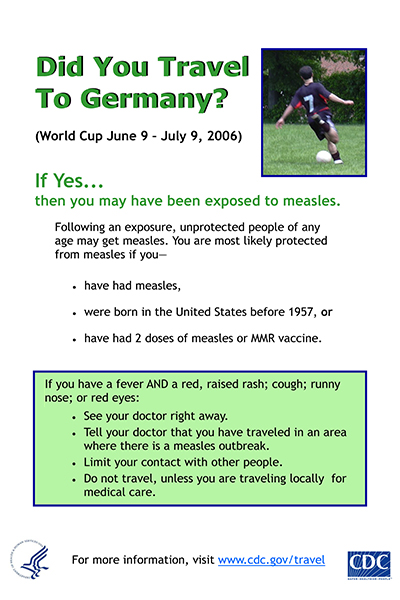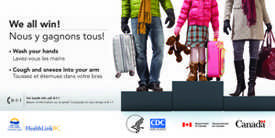Mass Gathering Preparedness - A Global Health Security Victory for All at World Cup in Brazil

Mass Gatherings Pose Unique Global Health Security Concerns

Measles poster used to raise awareness with travelers during the 2006 World Cup.
CDC is keeping the world safe and secure from infectious disease threats. Globalization of travel and trade increase the possibility and speed of these risks. To enhance global health security, CDC’s epidemiologists are studying ways to minimize public health and safety risks that intensify during mass gatherings.
A mass gathering is when a large number of people come together in a particular location for a specific purpose. Mass gatherings can be festivals, religious observances, sporting events, concerts, or political rallies. Mass gatherings pose unique health risks because having large numbers of people in a small space can aid the spread of infectious diseases. “The implications that mass gatherings have on global health security are not only due to people getting sick while in attendance, but a traveler attending the mass gathering could spread an infection further after returning home,” says DGMQ epidemiologist Dr. Joanna Gaines. Gaines further explains how injury and safety risks are also increased in a crowd, especially when local health care resources, security, and infrastructure are not adequate to meet the needs of large numbers of people.

Billboard used during the Winter Olympics in Vancouver, Canada, to help slow the spread of H1N1 flu.
Mass gatherings can cause a disease outbreak or amplify the spread of a disease if an outbreak already exists in the host location. For example, in 2013, an outbreak of Middle East Respiratory Syndrome coronavirus was peaking when people began traveling to Hajj in Saudi Arabia. In 2014 the outbreak continues to be closely watched. Other examples include a measles outbreak in Germany at the same time as the 2006 World Cup and the widespread 2009 H1N1 flu pandemic at the start of the 2010 Vancouver Winter Olympics.
DGMQ Leads Efforts to Protect People Attending Mass Gatherings
Examples of Mass Gathering Events with a Public Health Impact
- 1993: 69 crowd crush injuries at a Madison, Wisconsin, football game
- 1996: Thousands of heat-related illnesses; 111 injuries and one death due to bombing at the Atlanta Olympics
- 1997: Meningococcal outbreak from a soccer event in Belgium
- 2000: Meningococcal outbreak from Hajj pilgrims; 90 cases and 14 deaths
- 2008: Influenza outbreak at World Youth Day in Australia
- 2010: Measles outbreaks in Germany from a Christian pilgrimage in France
- 2013: Norovirus disease outbreak at World Youth Day in Brazil
For years, teams of scientists and communicators at CDC’s Division of Global Migration and Quarantine (DGMQ) have been protecting Americans from health and safety risks both in the United States and overseas. Dr. Gary Brunette, chief of DGMQ’s Travelers’ Health Branch, notes that the most cost-effective way to protect Americans from health threats beyond our borders is prevention and early detection. “We do not want to scare people from going to mass gatherings because it is fun to participate in social, religious, sporting, and other enjoyable large events. However, someone needs to be concerned about the risks, and that job falls on us,” Brunette says. “We look at mass gatherings, like the World Cup, from a risk perspective, and it is our job to constantly be working to reduce those risks.”
DGMQ conducts risk assessments to identify threats to the health of U.S. travelers going to mass gatherings abroad. The 2014 FIFA World Cup is expected to be one of the biggest mass gatherings of all time, leading DGMQ scientists to analyze all of the potential health and safety risk factors. Armed with data from multiple sources and expert analysis, DGMQ provides updated travel notices and guidance for event planners, travelers, and medical providers about the unique risks a traveler may face in Brazil.
CDC is also focused on developing research-based guidance for domestic mass gathering planners in the event of another flu pandemic. Germs like flu can spread easily in places where many people are in close contact with one another. Postponing or cancelling a mass gathering is one of several strategies that can be taken early in a pandemic to help slow the spread of disease.
Given the importance of focusing on ways to prevent health risks and detect diseases early at large events, Brunette and Gaines are spearheading a CDC-wide Mass Gatherings Working Group to harness expertise from across the agency. Ultimately, the working group aims to provide comprehensive risk assessment, surveillance, and preparedness support for mass gathering planners. This will make it easier for countries like Brazil to find the public health expertise they need to prevent global health security risks and leave behind a positive legacy in the wake of playing host to large and popular global gatherings.
With tens of thousands of U.S. travelers making the 2014 World Cup in Brazil their travel goal, CDC is working 24/7 to make it a global health security victory for us all.
For more information about DGMQ travel notices and CDC’s work on mass gatherings, go to:
- Page last reviewed: December 23, 2016
- Page last updated: December 23, 2016
- Content source:


 ShareCompartir
ShareCompartir